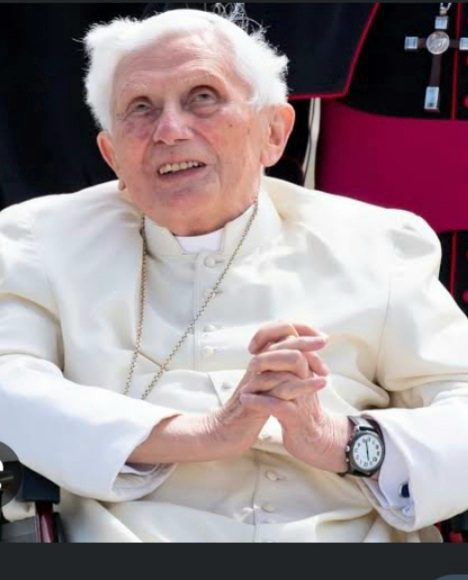
Joseph Ratzinger, officially Pope Benedict XVI, who died at the age of 95 on Saturday, December 31, 2022, will be remembered primarily as the first pope in 600 years to retire rather than die in office.
Pope from 2005 to 2013, Benedict was known for his strong conservative views and his efforts to promote traditional Catholic teachings. He also played a significant role in the Church’s response to the sexual abuse crisis and worked to improve relations with other faiths. He made efforts to keep the Catholic faith untainted, but weakened by his inability to drive home far reaching actions to sanitize the church. He also made conscious engagements to advance identifying with Jewish affairs during his tenure.
Any other achievements of his eight-year pontificate as Benedict XVI – and there were a few worthy of enduring note – will ultimately be overshadowed, first by the manner of his leaving office, and second because his papacy came between that of two controversial and bigger figures, his longtime boss, Karol Wojtyła, John Paul II, and Jorge Mario Bergoglio, Francis I, the self-proclaimed pope “from the ends of the Earth.”
Benedict spent his time in charge fine-tuning the legacy of the 27 years of the Polish pontiff in terms of doctrine. Benedict’s tenure saw essentially no change to the conservative compromise that John Paul had imposed on the significant theological conflicts that had preceded the reforming second Vatican council of the 1960s with Cardinal Ratzinger’s excellent and unwavering service.
Pope Benedict believed that the triumphs over more liberal Catholic voices on issues like sexual morality, clerical celibacy, the status of women, and religious freedom that had already been won in the later decades of the 20th century were secure. They did not stand the test of time as many were not advanced by his successor.
The clerical sexual abuse scandals
When Cardinal Joseph Ratzinger, who would eventually become Pope Benedict XVI, oversaw the Vatican’s doctrinal office, which dealt with the cases of priests suspected of abusing children, the clergy sex abuse scandal broke under Pope John Paul II.
When given case files, Cardinal Ratzinger occasionally initiated disciplinary actions, even ordering accused priests to be defrocked. But other times, the evidence reveals, he supported the accused priests and disregarded the victims’ pleas for help or their warnings that the abuser might go on to harm additional children.
The scandal broke out in the open throughout the entire world church when Cardinal Ratzinger was elected pope. It keeps resonating, leading some people to lose faith and posing difficulties for the church’s current leadership.
More than John Paul II, Benedict made more attempts during his tenure to purge the church of such immorality, but he was unwilling to hold bishops responsible for the abuses instead he kept transferring priests around from one duty to another. These actions angered victims and activists.
A report released in January 2022 showed that Benedict himself could not be absolved of wrong doing during his time in Germany before later ascending the position of leadership as pope.
In Munich, the Roman Catholic Church had set up a body to look into how the archdiocese handled sexual misdeed from 1945 to 2019.
In it, the report found that Benedict was complicit in mishandling four cases of sexual abuse of children in his days as archbishop in Germany. In addition, he was said to have deceived investigators in answers he supplied to them.
After the report was released, Benedict agreed that there were abuses and errors and asked for forgiveness though he admitted no wrong doing. Survivors and preys’ group expressed diverse feelings about his legacy.
Benedict had taken steps that would left solid legacy, especially in addressing the child sexual abuse calamity. He was the first pope to meet with victims, and he tendered apologies for the abuse that was allowed to worsen under John Paul II. He condemned the sexual sin in the church and expelled some offending priests.
But abuse survivors and their advocates accused Benedict of not doing enough in bringing punishing several priests, and in his handling of accusations against some priests when he was the head of the Vatican’s doctrinal office. He was also criticized as doing little to hold the leadership accountable for the scandalous actions.
Ratzinger, the German born cardinal made pope
In 1927, Josef Ratzinger was born in the Bavarian village of Marktl am Inn at a time Hitler was in control of Germany, the World War II was raging on. As a teenager, Ratzinger found that enrolling in the Hitler Youth organization was compulsory, and like it was done in his days, he enlisted.
The general perception of what relationship with Hitler meant in peace time for those that associated with the Third Reich did not matter much. It was common and acceptable given the circumstances, but the seemingly lukewarm manner in which he handled sexual abuse indignities in the church that blighted what would have been good legacy in his native Germany.
Funeral to be supervised by serving pope, another oddity
In the tradition of the Catholic Church, when a pope dies, a conclave is set in motion to select a new leader. The picture then is that there is no pope in power, but in this case the situation is peculiar; there is a sitting pope in the person of Pope Francis, who came in 2013. Now, he takes charge of the funeral of a predecessor.
A pope’s death customarily sets in motion a conclave to choose a new leader of the church. But Benedict’s successor, Pope Francis, was named when Benedict stepped down in 2013.
Now, a sitting pope is expected to preside over the funeral of his predecessor — an odd spectacle in the history of the church. The Vatican already released that on Saturday that Benedict’s funeral would be held in St. Peter’s Square on Thursday, January 5, with Pope Francis in charge of the affairs.
